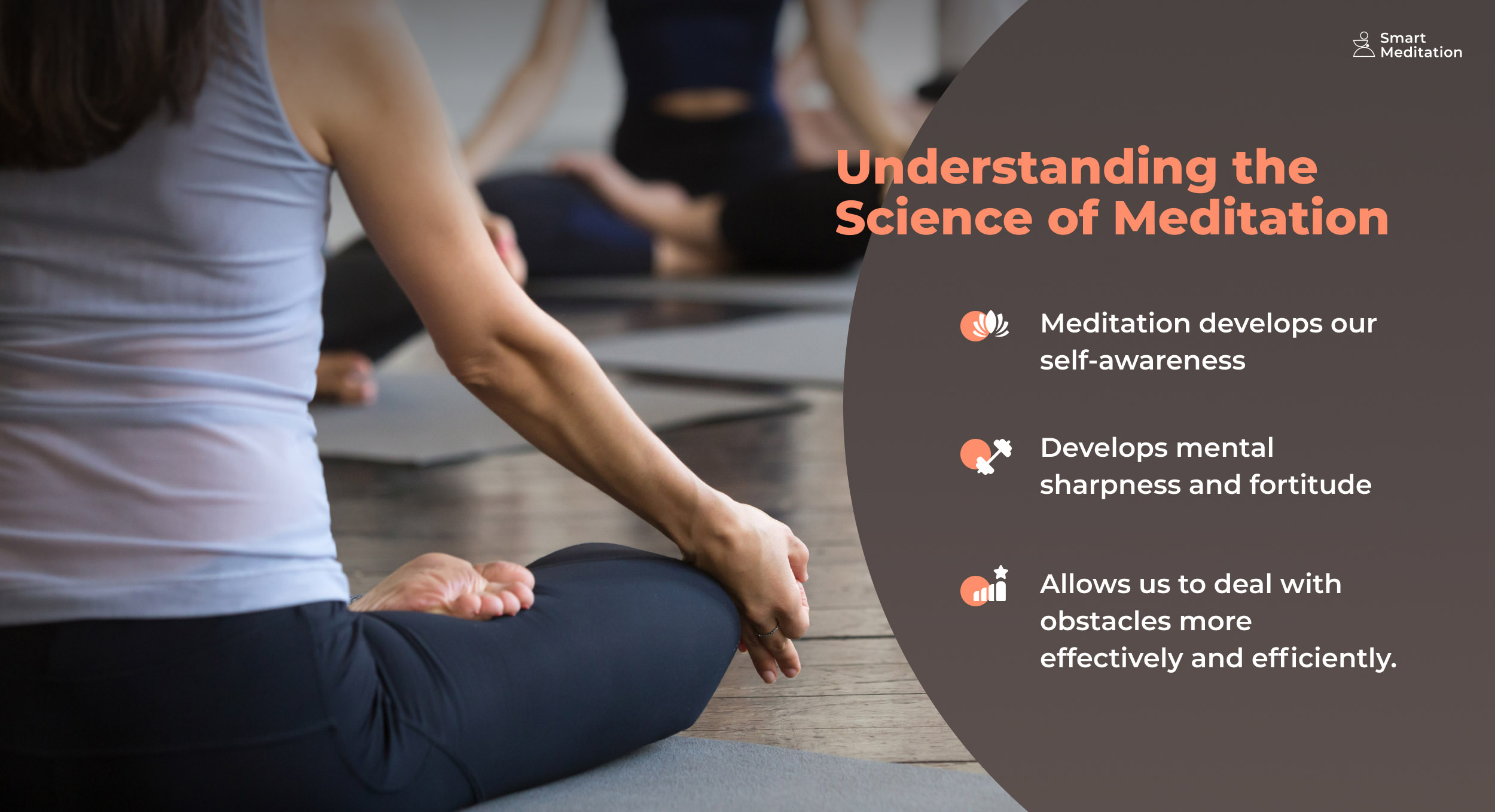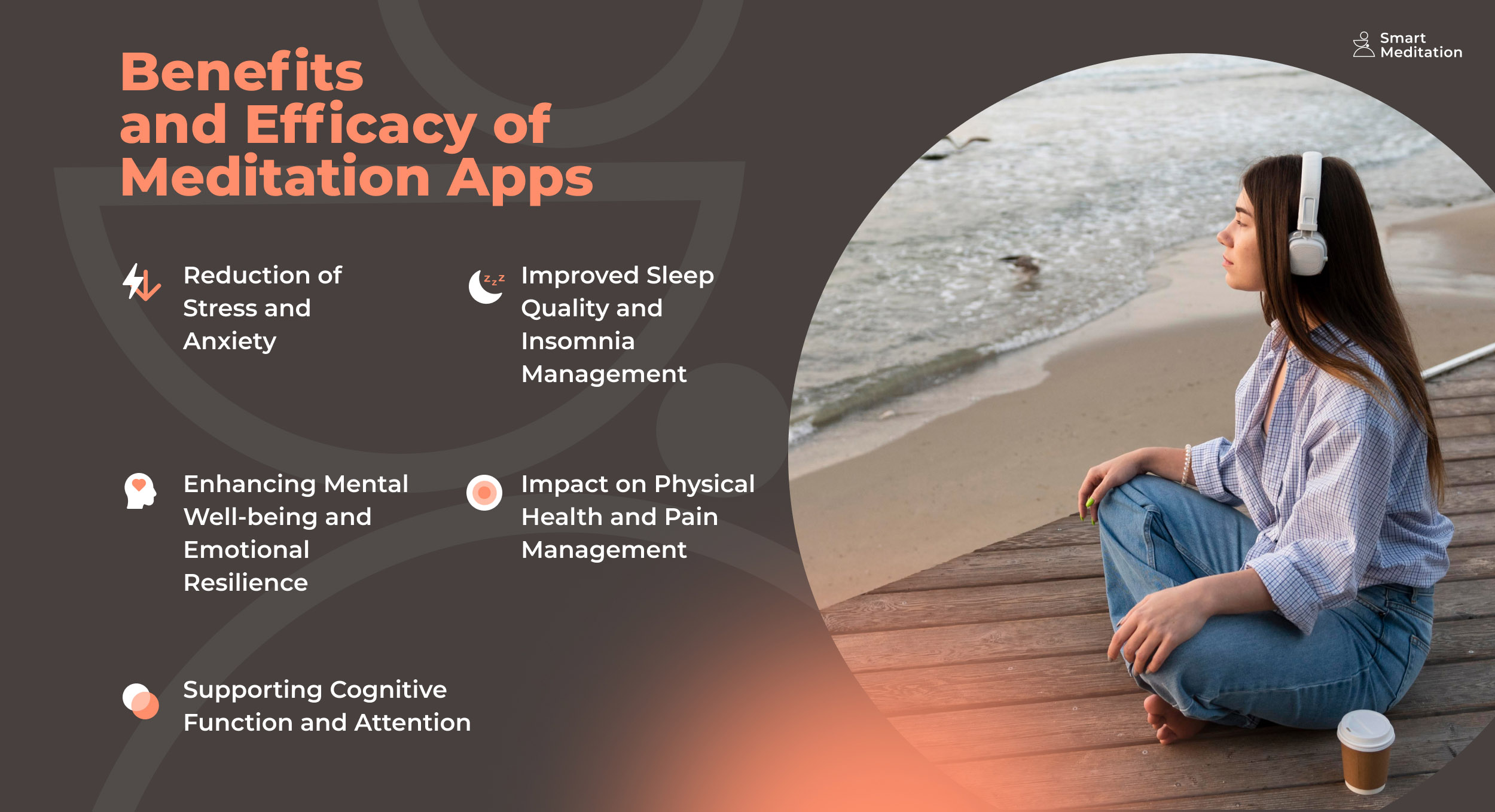
The Science Behind Meditation Apps: Are They Effective?
With each passing year, more and more people are discovering meditation apps as great additions to their practice. Thousands of users of Calm, Breethe, Smart Meditation and other apps have claimed that using a meditation app has made their hobby even more enjoyable and beneficial.
But what does science have to say about them? Do meditation apps work or are they mostly glorified placebo? Is guided meditation as effective as it claims to be? In this article, we’ll look deeper into how meditation apps really work, the science behind them as well as some challenges you might face when using one.
Understanding the Science of Meditation
At its core, meditation is just another type of cognitive activity. We’ve already covered the nature of different meditation techniques in this article; but to recap: meditation’s impact can be both physical (neurological) and mental (psychological).
When it comes to the physical side of things, meditation is known to have positive effects on the development of our brain, particularly the prefrontal cortex and amygdala, both of which are important for processing emotions and keeping stress under control. Meanwhile, psychologically, meditation develops our self-awareness and fosters an accepting and nonjudgmental mindset toward ourselves and our environments. It also develops mental sharpness and fortitude, allowing us to deal with obstacles more effectively and efficiently.

Mechanisms of Action in Meditation Apps
Now let’s look at the some of the most basic ways meditation apps do their job:
Guided Meditation and Mindfulness Training
Effective meditation apps usually have many guided meditation courses that are excellent for beginners – they provide high-quality step-by-step instructions for your sessions. You will get guidance from experienced instructors and specialists who will walk you through various practices and help you in the development of your self-awareness. Guided meditations also improve concentration by teaching you to focus on such things as your breath, body sensations, or imaginary visions.
Cognitive-Behavioral Techniques
Many meditation apps also use cognitive-behavioral strategies to treat negative thought patterns and promote optimistic thinking. For instance, you can find exercises for cognitive restructuring, affirmations, and stress-reduction techniques in the aforementioned guided meditation courses or other supporting materials. These exercises help you better tackle problematic situations, react to stress in a healthier way, and learn to be more open-minded so that opinions of other people don’t feel like a personal attack.
Audiovisual Stimulation and Relaxation Response
Lastly, certain meditation applications can make effective use of audiovisual stimuli to cause relaxation. They offer quiet music, tranquil natural noises, and comforting imagery to help you practice wherever you are. Some apps even take it a step further – they use specific tones or rhythms, such as binaural beats or isochronic tones that cause your brainwaves to synchronize, bringing you a sensation of calm and focus.
Research: Do Meditation Apps Really Work?
What meditation apps are capable of in theory sounds very appealing, but can they stand the test of scientific research? Let’s have a look at some of the most prominent pieces of research done in recent years and see if meditation apps are really worth it:
Clinical Trials and Experimental Studies
In 2019, a team led by J. Huberty conducted a randomized controlled experiment with 88 participants, using a well-known meditation app. They looked at sustained effects of an 8-week mindfulness meditation course compared to a control group. The outcomes were encouraging, with users of the app reporting significantly lower levels of felt stress and anxiety when compared to the control group. Additionally, users noted increases in self- awareness and focus, demonstrating the app’s beneficial effects on their mental health in general.
Comparison Studies: Meditation Apps vs. Other Modalities
A 2015 research by a team led by M. Mani reviewed and evaluated around 700 mindfulness apps available in the app stores. For their evaluation, they used an expert rating system called Mobile Application Rating Scale (MARS); they also contrasted the effects of a mindfulness training program conducted in person with those of meditation apps. The findings showed that the majority of the apps available at the time left much to be desired, whereas the effects of a select number of high-quality ones was deemed as positive, albeit inconclusive.
Longitudinal Studies: Effects of Regular App Use
A cross-sectional and longitudinal study conducted in 2019 by Sh. L. Duraimani revealed that after 90 days of consistent meditation app usage, most participants reported a substantial reduction in stress and anxiety. The results also showed that even during the course of the 3-month experiment, participants felt gradual stress reduction, and overall steady improvement of their mental health.
Benefits and Efficacy of Meditation Apps
In this section we’ll pay more attention to each of the major meditation app benefits separately:
Reduction of Stress and Anxiety
Reducing stress and anxiety is the number one reason why people decide to take up meditation – and a number of scientific studies do support the idea of it being a viable solution. In this eight-week research, for instance, the mindfulness meditation practice has decreased the amount of cortisol (also known as the “stress hormone”), and reduced cortisol-induced inflammatory responses like increased heart rate and blood pressure.
Improved Sleep Quality and Insomnia Management
Research has also shown that meditation apps can enhance sleep quality and assist people in managing insomnia. People who consistently use apps are known to experience notable increases in a number of sleep quality metrics, such as sleep efficiency, duration, and reduced sleep disruptions.
Enhancing Mental Well-being and Emotional Resilience
On top of that, meditation apps are known for helping develop mental fortitude. Numerous studies suggest that regular meditation app users show substantial declines in depressive symptoms as well as a significantly more positive outlook on their lives and on the world overall.
Impact on Physical Health and Pain Management
Apps for people who meditate can also help them manage their discomfort and maintain physical health. For example, a study on the impact of a mindfulness meditation app on pain perception was undertaken by Dr. Zeidan in 2016. According to the findings, people who used the app reported lessened chronic pains as well as the feeling of pain alleviation to a certain degree when meditating.
Supporting Cognitive Function and Attention
Last but not least, meditation apps can help with focus and cognition. Guided mindfulness practices have been shown to improve users’ attention span, memory, as well as cognitive flexibility. By consistently practicing meditation through apps, we can sharpen our mental faculties, improve our ability to concentrate, make decisions, and maintain mental clarity.

Factors Influencing Meditation App Effectiveness
Meditation app efficacy depends on many factors; below are some of the most important ones:
User Engagement and Adherence
User engagement and commitment are two key elements – according to research, people tend to gain more benefits from a meditation app when they feel that the app engages with them in a meaningful way and makes them come back to meditating every day. Participants in a 2016 research by A. Howells who used a meditation app more regularly and meditated for longer periods of time reported feeling less nervous and having better wellbeing.
App Design and Interface
The layout and user experience of a meditation app can also significantly affect its efficacy. According to numerous studies, user happiness and engagement are significantly higher when users are presented with aesthetically appealing interfaces and easy-to-use features.
Tailoring and Personalization
Meditation apps are also proven to be more meaningful when the courses and programs they offer can be altered to fit individual tastes, objectives, and experience levels. According to research, users tend to be more engaged when meditation sessions are tailored to their preferences, i.e. specific meditation sessions lengths or types.
Quality and Expertise of Guided Meditations
The app’s usefulness is greatly influenced by the caliber and knowledge of the guided meditations it offers. That is because guided meditations that are skillfully designed and delivered by qualified meditation teachers or specialists provide helpful direction and support. In the aforementioned research by Huberty, an app’s efficacy is at least perceived to be better by users when it collaborates with well-known experts or offers guided meditations led by certified professionals.
Integration with Other Tools and Techniques
Lastly, some applications offer extra resources that support the practice of meditation, such as supporting reading material, and allow for integrations with third-party health devices and apps. Research suggests that such apps are more likely to have a strong positive influence on a user’s wellbeing, providing them with a more all-encompassing and flexible platform to learn about and develop their meditation practice.
Potential Limitations and Challenges
To provide a balanced view of meditation apps, we’d also like to mention some of the downsides that they almost universally share:
Lack of Standardization in App Content and Quality
Because of how many apps there are on the market, users may find it challenging to figure out which ones are reliable and efficient. It also doesn’t help that there isn’t yet a universal meditation app rating system that would help differentiate good apps from bad ones (although, there have been attempts at that). Ultimately, what the users have to mostly rely on is their own judgment and the information they can get from free trial or app reviews.
Individual Variability in App Experience and Outcomes
Quite naturally, each person may react differently to particular methods, session durations, or instructions offered by the apps. The results can also be influenced by such variables as past meditation experience, motivation, and individual objectives. That’s why it’s important to understand that an app that works great for your friend may not work as well for you – make a calculated decision based not only on recommendations, but other factors as well.
Accessibility and Equity Concerns
While meditation apps do strive to be easy-to-use, there are still questions concerning their accessibility for all groups of people. And it doesn’t only involve people with disabilities – some people might not be able to make use of very basic functions simply because the fees are too high. Regardless of a person’s socioeconomic status, they should ideally be able to benefit from meditation apps at least in some capacity.
Balancing Technology Use and Mindfulness Practice
Finally, finding a balance between technology usage and having a focused experience can also be a problem with meditation apps. Yes, they can be useful tools, but relying too much on technology might impede the growth of inner awareness and self-control. That’s why it’s crucial to keep in mind that practicing mindfulness involves being mindful both in front of and away from a screen.
How to Choose a Good Meditation App
We’ve talked a great deal about how to correctly choose a meditation app in one of our previous articles; here we’d like to briefly describe the qualities and features you should be looking for:
- Reasonable Price: arguably the most important factor – don’t commit to an expensive yearly subscription if you’re not sure about the app’s value for money;
- Wide Variety Of Courses: choose the app that has all types of meditation that you may be interested in – from body scans to breathing exercises;
- Good Reputation: pay attention to what other users have said about this or that app; only go for apps that have mostly positive reviews;
- Scientifically Proven: contrary to popular belief, only a few apps are actually certified by researchers and experts in the field; try to investigate whether apps have appropriate credentials or have collaborated with renowned specialists.
Conclusion
In the end, what are good meditation apps? With more and more apps coming out every year, it’s reasonable to assume that not every one of them is going to offer good value for money – and research confirms that. But what it also confirms is that those meditations apps that are scientifically proven (such as Smart Meditation) can have a greatly positive impact on one’s mental health and can complement one’s meditation practice very well.
Good meditation apps will boost your cognitive abilities, help you sleep better, and most importantly, make your life much less stressful and much more colorful. Just make sure to choose one that is reasonably priced, highly rated and offers a good variety of meditation courses.






